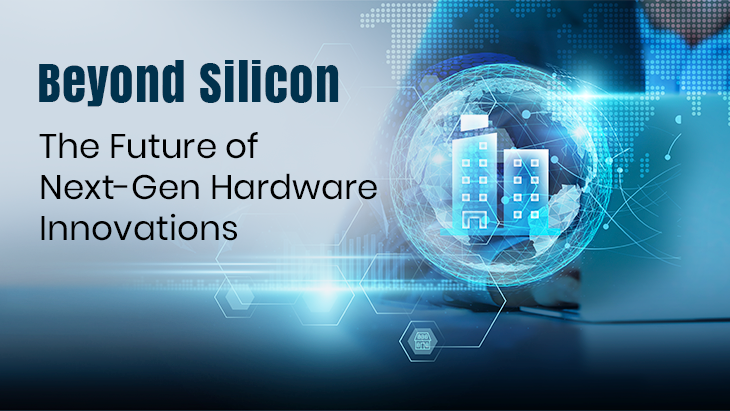The technology landscape is experiencing a profound revolution, and hardware developments are leading this revolution. As industries call for efficient, strong, and sustainable computing solutions, conventional silicon-based hardware is being incrementally replaced with next-generation materials and architectures. Integrated IT & Hardware Solutions are central to rebuilding the future of computing, opening the door to revolutionary breakthroughs in artificial intelligence, quantum computing, and energy-efficient systems.
The Shortcomings of Silicon-Based Hardware
Silicon has been the pillar of computer technology for many decades, allowing for the accelerated expansion of microprocessors, memory chips, and integrated circuits. Nevertheless, as Moore's Law peters out, the shortcomings of silicon-based hardware become increasingly obvious. The reduced size of transistors increases power usage and excessive heat output, which compromises performance and reliability. Furthermore, the growing need for data processing in sectors such as cloud computing, artificial intelligence, and autonomous vehicles necessitates new solutions beyond silicon chips.
The Emergence of Alternative Materials in Hardware Design
In order to break the limitations of silicon, scientists and engineers are seeking new materials that provide better performance, energy efficiency, and longevity. Some of the most promising materials are:
Graphene: Due to its outstanding electrical conductivity and toughness, graphene is capable of substituting silicon in transistors to yield faster, as well as energy-efficient, processors.
Gallium Nitride (GaN): This semiconductor compound is being widely applied in power electronics as well as radio frequency applications due to its high voltage and temperature handling capacity.
Carbon Nanotubes: These minuscule cylindrical tubes exhibit exceptional electrical as well as thermal conductivity and are applicable for ultra-fast computing technologies.
Quantum Computing: A Step Ahead of Conventional Processors, Quantum computing is proving to be one of the most groundbreaking developments in hardware technology. In contrast to traditional computers that employ binary bits (0s and 1s), quantum computers utilize qubits, which can exist in more than one state at a time. This makes them capable of executing complex computations at speeds never before seen, making them perfect for applications like cryptography, molecular modeling, and artificial intelligence.
Integrated IT & Hardware Solutions: Play a vital role in filling the gap between quantum and classical computing, allowing for smooth integration into current IT infrastructures. IBM, Google, and Microsoft are investing heavily in quantum research, with the aim of commercializing quantum computing for practical applications.
Neuromorphic Computing: Imitating the Human Brain
Another revolutionary hardware technology innovation is neuromorphic computing, which aims to emulate the brain's neural networks. Conventional computing architectures are challenged by the human brain's parallel processing abilities, resulting in inefficiencies in AI-based applications.
Neuromorphic chips like Intel's Loihi make use of artificial neurons and synapses to better process information. These chips provide real-time learning and low power consumption, which makes them well-suited for edge computing, robotics, and autonomous systems.
The Function of Integrated IT & Hardware Solutions
With the ongoing development of next-generation hardware innovations, the requirement for integrated IT & hardware solutions is more important. Organizations and companies need smooth hardware-software integration in order to reap the maximum benefit of high-end computing technologies.
Integrated IT solution providers are creating hardware architectures that have been optimized to meet the unique requirements of particular industries. It could be cloud computing powered by AI, IoT-based smart devices, or supercomputing—these solutions have the advantage of being compatible, scalable, and efficient.
Energy-Efficient Computing: Sustainability in Hardware Innovation Sustainability is increasingly a topic of interest within the technology space, as computing infrastructure and data centers burn vast amounts of power. Emerging hardware solutions are now prioritizing decreasing power draw with high performance.
Photonic Computing: In lieu of electricity to carry information, photonic computing dramatically cuts back on heat dissipation and power usage.
Low-Power AI Chips: Specialized AI processors designed by companies such as NVIDIA and ARM offer high efficiency with low power consumption.
Edge Computing: By processing data at the source instead of using cloud servers, edge computing reduces latency and power consumption.
The Future of Next-Gen Hardware
The future of hardware innovation will be the merging of several different technologies, such as quantum computing, neuromorphic computing, and novel materials. As these technologies further evolve, sectors from healthcare to finance will be helped by quicker, more secure, and more effective computing.
With integrated IT & hardware solutions at the forefront, companies can take advantage of these innovative technologies to gain a competitive advantage. Moving beyond silicon is not merely a technological transition it's a revolution that will revolutionize the manner in which we engage with computing systems in the digital age.
Conclusion
The age of Praise Group classical silicon-based computing is slowly yielding to more complex and sustainable hardware technologies. Ranging from quantum computing to low-power AI chips, next-generation hardware technologies have the potential to transform industries and propel technological advancement. By adopting integrated IT & hardware solutions, organizations and companies can remain ahead of the curve, enabling smooth adoption of such revolutionizing technologies. As we look beyond silicon, the future of computing holds unprecedented efficiency, performance, and innovation.





Leave a reply